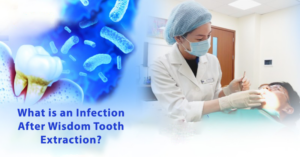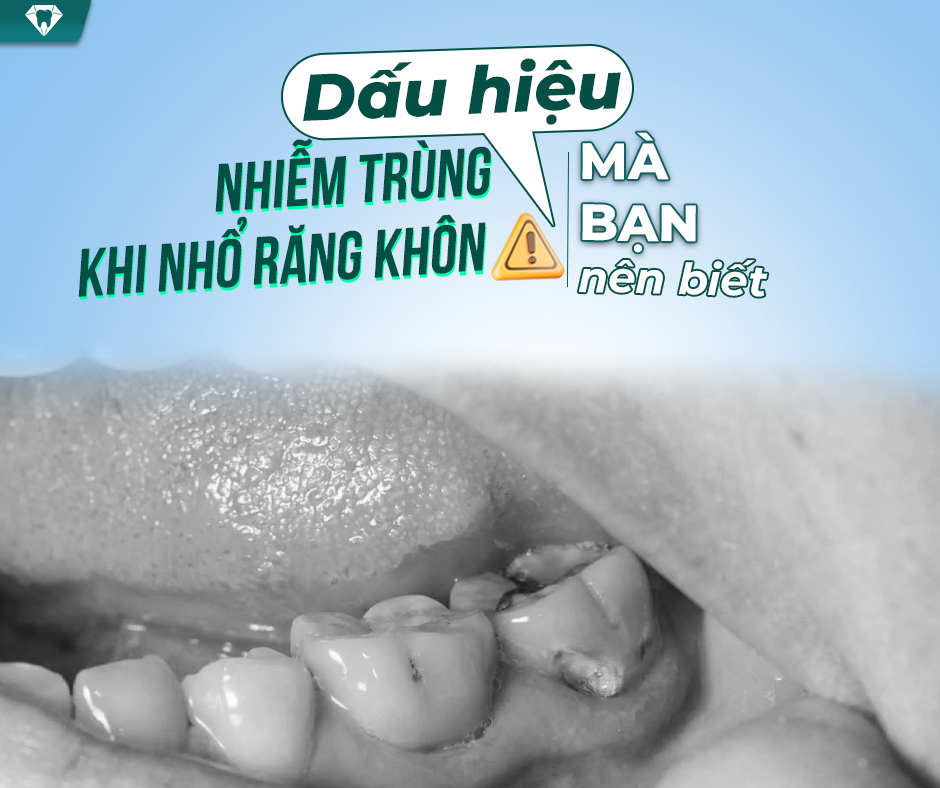Wisdom tooth extraction is a common minor oral surgery, but without proper post-operative care, there is a high risk of infection. An infection can cause severe pain, prolonged healing, and even more serious complications if left untreated. Recognizing the signs of infection after wisdom tooth extraction is essential for a smooth recovery. In this article, Joy International Dental Clinic will guide you through the symptoms, causes, treatment, and prevention of infections after wisdom tooth extraction.
1. What is an Infection After Wisdom Tooth Extraction?

An infection after wisdom tooth extraction occurs when bacteria invade the surgical site, leading to inflammation, swelling, and pain. This can happen due to poor oral hygiene, a weakened immune system, or inadequate post-operative care. In some cases, improper surgical techniques or contamination during the procedure may also increase the risk of infection.
2. Signs of Infection After Wisdom Tooth Extraction
Recognizing an infection early can prevent complications and ensure proper treatment. Here are the most common symptoms:
2.1 Persistent and Worsening Pain

Pain after a wisdom tooth extraction is expected, but it should gradually improve within a few days. If the pain becomes more intense, throbbing, or does not subside after 3-4 days, it may be a sign of infection.
2.2 Infection after wisdom tooth extraction causes swollen gums
Mild swelling is normal post-extraction, but if the gums remain swollen, red, and tender for an extended period, this could indicate an infection. Severe cases may also lead to difficulty opening the mouth.
2.3 Excessive Bleeding and Slow Healing
Some bleeding is expected within the first few hours after extraction. However, continuous bleeding beyond 24 hours or the presence of dark, thick blood with a foul odor suggests a problem. Slow healing can also indicate an infection.
2.4 Bad Breath and Unpleasant Taste

An infected wound harbors bacteria, which produce foul-smelling gases, leading to persistent bad breath. You may also experience a metallic, bitter, or sour taste in your mouth.
2.5 Pus Formation at the Extraction Site
Pus, which appears as a white or yellowish discharge, is a clear indication of infection. If you notice pus oozing from the extraction site, seek immediate dental attention.
2.6 Fever and Chills

A body temperature above 38°C (100.4°F) accompanied by chills and fatigue indicates your immune system is fighting an infection. Persistent fever is a serious sign that requires medical intervention.
2.7 Sensitivity in Adjacent Teeth
An infected extraction site can cause nearby teeth to feel more sensitive to hot, cold, or pressure, making eating and drinking uncomfortable.
2.8 General Fatigue and Discomfort
An untreated infection can lead to systemic symptoms such as fatigue, headache, or body aches, making you feel generally unwell.
3. Causes of Infection After Wisdom Tooth Extraction
Several factors contribute to post-extraction infections. Understanding these causes can help you take preventive measures:
- Poor Oral Hygiene: Inadequate cleaning of the mouth allows bacteria to accumulate around the wound.
- Food Debris in the Socket: Small food particles trapped in the extraction site can create a breeding ground for bacteria.
- Smoking and Alcohol Consumption: These habits impair blood circulation and delay wound healing, increasing the risk of infection.
- Pre-existing Gum Disease or Cavities: If you had an underlying oral infection before the extraction, bacteria could easily spread to the surgical site.
- Weakened Immune System: People with diabetes, autoimmune disorders, or those undergoing chemotherapy are more susceptible to infections.
- Improper Surgical Procedure: If the extraction was complicated or performed in non-sterile conditions, there is a higher chance of post-operative infections.
4. Treatment Options for Infected Wisdom Tooth Extraction Site
If you suspect an infection, follow these steps to prevent complications:
- Visit a Dentist Immediately: A professional evaluation is necessary to confirm the infection and determine appropriate treatment.
- Antibiotic Therapy: Dentists often prescribe antibiotics to eliminate bacterial infections. Be sure to complete the full course of medication.

- Pain Management: Over-the-counter pain relievers such as ibuprofen or acetaminophen can help control discomfort.
- Saltwater Rinses: Gently rinsing your mouth with warm saltwater several times a day can reduce bacteria and promote healing.
- Avoid Hard, Spicy, or Acidic Foods: Stick to a soft diet to avoid irritating the wound and delaying recovery.
- Maintain Good Oral Hygiene: Carefully brush around the extraction site and use an antimicrobial mouthwash as directed.
- Drainage Procedure (if needed): In severe cases, the dentist may need to drain the pus and clean the infection site.
5. Preventing Infection After Wisdom Tooth Extraction

Prevention is always better than treatment. Follow these essential tips to minimize the risk of infection:
- Adhere to Post-Extraction Care Instructions: Follow all guidelines provided by your dentist for optimal healing.
- Avoid Rinsing or Spitting Too Soon: Wait at least 24 hours before rinsing to allow the blood clot to form properly.
- Use a Cold Compress: Applying ice packs in the first 24 hours helps reduce swelling and discomfort.
- Drink Plenty of Water: Staying hydrated supports your body’s natural healing process.
- Refrain from Smoking and Alcohol: These can delay healing and increase the risk of infection.
- Eat Soft and Nutritious Foods: Opt for foods like yogurt, mashed potatoes, and smoothies to avoid disturbing the surgical site.
- Sleep with Your Head Elevated: This helps reduce swelling and prevents excessive bleeding.
Conclusion
Infections after wisdom tooth extraction can cause serious complications if not detected and treated early. By recognizing the warning signs and following proper care instructions, you can ensure a smooth recovery. If you experience persistent pain, swelling, fever, or any other concerning symptoms, do not hesitate to seek professional dental care. For expert advice and treatment, contact Joy International Dental Clinic today!






